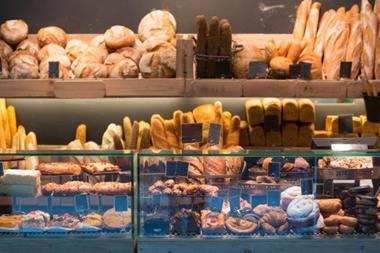Welcome to the next feature in The Bakery Project, a series exploring some of the ways to start or expand a bakery business. This month, advice on accountancy, legal compliance and insurance.
Let’s face it, no-one opens their own bakery for the paperwork. Who wants to be applying for insurance when they could be experimenting with a new sourdough starter? Or navigating the HM Revenues & Customs (HMRC) website when they could be decorating a doughnut?
But financial and legal considerations are an essential part of running a business successfully, and good advice and planning may prevent many of the headaches that can derail your plans.
Considering bookkeeping and accounting as a necessary evil undertaken only to satisfy HMRC would be a mistake, warns Clive Lewis, head of enterprise at the Institute of Chartered Accountants in England and Wales (ICAEW).
“Keeping up-to-date and accurate accounting records is vital to providing the bakery proprietor with the information they need to control the business, particularly on cashflow and financing requirements as well as profitability,” he says.
Monitoring these key aspects of running a business can be invaluable should a bakery require additional finance and need to explain to potential backers how it is performing, how it compares with the competition and how the bakery will use the finance requested, he adds.
With good accounting such a vital part of the business mix, finding the right accountant is key. It’s something not to be rushed, advices the ICAEW, which offers tips on the process (see p28).
Whether that accountant should have knowledge of food or retail depends on the services a business requires, advises Lewis, who says specialist knowledge is not needed if you only require an accountant for basic accounts preparation, tax returns, and agreeing tax liabilities.
“However, if you are looking for an adviser who provides benchmarking services to tell you how your business compares with others in the sector, then an accountant with specialist knowledge of the sector would be an advantage,” he adds.
If done right, appointing a suitable accountant will be the start of a long relationship.
“We have stayed with our accountant throughout our journey in the bakery business,” says Mark Sheath of Jengers Craft Bakery in Billingshurst, West Sussex. “This relationship is a very special one. We took advice before purchasing the bakery business, so our accountant knows us and the business inside out, which I feel is very important.”
Rex Bakery, in Little Chalfont, Buckinghamshire, has also stayed with the same accountant since it started trading. Owner Glenn Stephens explains that the accountant is involved with the bakery’s payroll once a month, and also quarterly VAT reporting.
“Other than that we see him once or twice a year, although occasionally I ask for his advice,” adds Stephens. “When we bought a van for wholesale deliveries, he discussed the various financing options and I did the rest."
Businesses also have to decide whether they will employ a bookkeeper or do the bookkeeping – the recording of financial transactions – themselves.
The ICAEW explains that the length of time it will take a bakery owner to write up their own records depends on the number of transactions and whether the bakery buys and sells on credit, which would require a purchase and sales ledger as well as a cash book. VAT will add to the work for any business with an annual turnover of more than £85,000.
“Many business owners work long hours and are glad to pass bookkeeping and accounting duties to a bookkeeper,” says Lewis. “However, they need to be sure the bookkeeper has the relevant experience and qualifications.”
Modern accounting software (see box-out on p28), can help ease the burden of doing the books, as Lee Smith of Bexhill Farm Kitchen explains.
“We do our own bookkeeping and then get it signed off and submitted annually by an accountant,” he says. “With the new bookkeeping and payroll programmes out there, it is made so much easier.”
Smith says the business has a system for its wholesale production, accounts and invoicing that he describes as “invaluable”.
“The payroll one links in directly with the HMRC end-of-year returns. The time spent varies, but is probably 80 hours a month minimum including the production, accounts and weekly payroll,” he adds.
Stephens has employed a bookkeeper from day one. “Ultimately, if you are starting a bakery, the chances are that you are doing this to make delicious things for customers,” he says.
Robust bookkeeping and accounting systems can help businesses avoid financial trouble spots.
Sheath at Jengers Craft Bakery, which operates a business that is 60% wholesale and 40 % retail, advises that bakeries use meticulous record-keeping to keep on top of wholesale payments.
“It is always a challenge to get money out of wholesale customers, as all but a few hold on to their cash,” he adds.
Smith says the only financial mistake his business has made is not adjusting pricing more quickly as costs such as ingredients and wages increased. “This can put a strain on cashflow,” he adds.
Bakeries must also ensure they comply with any legal requirements. These include registering with the local authority and considering any health and safety risks (see p26).
“My advice would be to speak to all the relevant authorities associated with the food industry – local council, environmental health, trading standards, Health and Safety Executive – and get them on board,” says Sheath. “Share your passion and vision
for the business and get advice; ours were fantastic.”
“We personally felt we wanted our own food safety system for our business, so employed a specialist to write our own document, which helped us dramatically with our paperwork,” he adds. “You do not need to spend £1,000 but we felt it was a fantastic investment for our future food safety.”
Hazard Analysis and Critical Control Point (HACCP) principles should be used to develop a plan to manage food hygiene and safety risks.
Stephens at Rex Bakery advises that bakers read up on HACCP and get on top of this aspect of their business before they start trading.
“Run a tight HACCP plan and read about what legislation is coming down the pipeline specifically in [terms of] food production space,” he adds.
Many bakers recommend that those setting up in business by themselves join a trade organisation, such as the Craft Bakers Association or Scottish Bakers, and ask them for advice when required.
“My advice would be to join an affiliated association and keep fully up to date with new legislation, rules and laws,” says Smith.
In particular, trade associations can be helpful in dealing with the difficult area of employment law, and may also be able to help when it comes to organising insurance.
Although employers’ liability is the only legal requirement when it comes to insuring a business, owners must consider the risks in running a bakery, and the need to protect their business, their customers, their employees and the general public, says Kirsty Hampton, assistant mutual manager at cover provider The Retail Mutual.
“As the Great Fire of 1666 famously proved, one of the key risks for bakers is fire, so it is always wise to ensure you have suitable levels of cover,” she says. “Your insurer will want to be satisfied that you are baking in a safe environment.”
Other covers include business interruption, which can help keep a business in operation should equipment break down, as well as insuring contents, stock and goods in transit.
Like all the topics in this feature, take expert advice before making any decisions.
Key legal considerations when setting up a bakery business
Registering your premises
Any premises selling, cooking, storing, handling, preparing or distributing food must be registered with the local authority. If you will be supplying meat or dairy products to other businesses (rather than direct to consumers), the premises may also have to be approved by the local authority.
Health and Safety
As a business owner you must be aware of any health and safety risks to staff, customers and any other members of the public who may come on to the premises or consume the products sold, and ensure you have public and product liability insurance in place.
If you employ any staff, you must:
- Consider what risks of harm there are to staff and what precautions you can take (for example, injuries from repetitive work, respiratory or eye irritation from flour dust, accidents when operating machinery or ovens);
- Provide staff with the training and equipment they need to do their job safely; and
- Provide toilets, hand-washing and first aid facilities.
If you have five or more employees, you must have a written health and safety policy that describes the arrangements in place.
You should keep a record of all accidents on the premises. Certain serious accidents, occupational diseases and specified dangerous occurrences must be reported to the Health and Safety Executive.
Labelling
Certain information needs to be displayed on food products, such as ingredients, allergen information, food additives and warnings for certain ingredients. This can differ depending on the product and how it is packaged.
Consumer Rights
Under the Consumer Rights Act, all products sold must be as described, match any sample given prior to purchase, be fit for purpose, and of satisfactory quality. What is “satisfactory” will depend of the product and luxury goods will be held to a higher standard than a bargain product.
Employment
If you are employing any staff, there a number of things to be aware of to ensure you don’t fall foul of employment laws, including, but not limited to:
- Employees are entitled to a contract setting out specific information about their employment;
- Employees must be paid the minimum wage; and,
- Employees are entitled to statutory sick pay and to take at least 28 days a year as paid holiday (reduced pro rata for part-timers).
Katherine Plunkett, Blake Morgan LLP
Insurance: have you got your bakery covered?
Operating a bakery has much in common with the operation of other businesses, while carrying risks more specific to this trade.
If you have any full or part-time employees, or you use temporary staff, casual workers or contractors, you are required by law to have employers’ liability cover. This covers you in the event of a claim from anyone who becomes ill or is injured as a result of working for you, be it in commercial premises or if you are operating your bakery from home.
While employers’ liability is the only legal requirement when it comes to insuring your business, consider the inherent risks of operating a bakery, and take reasonable steps to protect yourself, your customers, your employees and the general public.
One of the key risks for bakers is fire so it is wise to ensure you have suitable levels of cover. Your insurer will want to be satisfied you are baking in a safe environment and, as flour is highly combustible, that it is stored appropriately. For guidelines around the storage of flour and other raw ingredients you can refer to the Health and Safety Executive on www.hse.gov.uk.
Any major damage to your premises or baking equipment can have huge repercussions. Business interruption cover can help keep you and your business afloat in the event you are unable to trade while the damage is being repaired.
Other useful covers to consider are contents, stock and goods in transit, and if you are providing services to the general public, such as operating a tea room or high street bakery store, it is wise to include public and products liability cover to protect yourself against claims such as those due to slips and trips or food poisoning on your premises.
If you own your premises, you will need buildings cover to protect it – and if you are operating from home, don’t assume you will be covered by home insurance. If you have any doubts, always check with your cover provider.
When getting quotes for your bakery business, always check the details carefully so you can be sure you are comparing like with like. There is a wide range of cover providers to choose from, from traditional insurers to organisations such as The Retail Mutual, a member-owned firm providing an alternative form of cover.
Kirsty Hampton, assistant mutual manager, The Retail Mutual
Tips on choosing a qualified accountant
What to look for
- A firm similar in size to yours or has clients a similar size to yours; they will be more understanding of issues you will face.
- Do they have experience of clients in the same sector as you? Do they provide all you require?
- What is their reputation? Ask business contacts if they have had dealings with the firm.
- Will they be acceptable to third parties such as finance providers?
- For services such as audit, investment business or legal work, make sure the accountant is authorised to undertake the work.
- Are they members of a recognised accountancy body. What qualifications do they have? Are they chartered or certified? Do they have professional indemnity insurance so you are covered?
Making contact
- Take time to find the right firm.
- Telephone three to six firms and meet with at least three.
- Is the first meeting free of charge?
- Check whether they offer the services you will need.
- Tell them the accounting records you keep. Can they suggest improvements? What software do they recommend?
- Ask for comments on your business plan.
- If you want personal financial advice, can they provide this?
- Establish what the fees will be and when they are payable.
- Establish who will deal with your work – it may not only be the person you are meeting with.
- Ask to speak to existing clients.
- Ask how much they estimate the first year’s charge will be.
After appointing a firm
- You should receive a letter setting out terms and conditions.
- Your accountant should stay in touch, not just at the year-end.
- Tell your accountant as soon as possible of changes in your business, problems, etc.
- After accounts have been prepared, you should get a letter setting out future tax liabilities.
- Review your accountant’s charges every three to five years.
- From time to time, assess whether your accountant’s services still match your needs.
- If you plan to sell your business your accountant may help with the sale and minimising tax liabilities.
- Information supplied by the Institute of Chartered Accountants in England and Wales (icaew.com)
Accounting software
Accounting software can offer advantages over paper bookkeeping including:
- Producing invoices meeting VAT and HMRC requirements;
- Emailing invoices and reminders to customers;
- Enabling the business to keep accurate and up-to-date records;
- Production of VAT returns;
- Immediate information on debtors and creditors;
- Easy production of profit and loss account and balance sheet;
- Produce tagged accounts to accompany online filing of corporation tax returns.
Cloud-based accounting
Online software stores data in a database on the servers of the organisation providing the business’ service. The service provider takes responsibility for safety and security of data.
Advantages include:
- Data can be remotely accessed at any time by an authorised individual;
- Businesses ‘rent’ software through a monthly charge so ‘up-front’ costs are lower;
- Businesses can upgrade hardware when it suits them;
- An adviser can access the data and help ensure records are up to date and reconciliations regularly undertaken.





























No comments yet